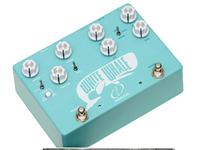'Please Mend The On Switch': Diaries of a Guitar Tech
Amped blogger Neville Ward on the life of a guitar tech 08-May-13

An amp in the middle of repair // Some rights reserved // Tim Patterson |

Amped blogger Neville Ward kicks off his new blog on the life of a guitar tech with an article on what it means to be the man responsible for making the gear tick...
As a repair man, I inhabit a slightly different world to my customers. They use machines, and their understanding of those machines is usually confined to the relationship between the knobs on the machine and the sound coming out of it.
I fix the machines when they break, and I don't understand much about persuading the machines to make that sound that makes you go "Oooooh" or raises the hairs on the back of your neck, but I do understand how the energy gets from the wall socket to your ears, and I do understand all the little pieces that contribute to that process, their weaknesses, their typical failure modes and the collateral damage that they are likely to cause when they die.
Of course, I do expect my customers to have some idea about how their machines work, as this helps them to use the machines effectively. I don't mean anything very technical, mostly just common sense, applied to the machine or collection of machines.
So I was rather bemused when a new customer, let's call him Bob, brought in a combo, saying it needed a new on-off switch. From our brief conversation on the phone, I was assuming that the switch had been bent or snapped off, but when I saw it, it looked fine and moved correctly.
I mentioned this to Bob and he said "Yes, but the amp doesn't come on, so the switch must be broken." There is a certain logic to this. It was definitely possible that the contacts inside the switch had burned, bent or disintegrated, but my years of experience told me that it was far, far more likely, given that the switch appeared OK, that the amp had suffered a serious failure and blown an internal fuse.
I told Bob that there were many parts in an amplifier, and that a failure in almost any of them could cause it to not "come on". Bob seemed to struggle with this. He reiterated: "It's not coming on, so it must be the on-off switch that's the problem." I realised that this was going to take some time. I was gentle with Bob.
I made an analogy with a car with no petrol, but an ignition switch that worked fine, and how he still wouldn't be driving anywhere. He seemed to follow, so I expanded the metaphor to include a dead battery, a snapped prop shaft and even somebody nicking the alloy wheels. Gradually the realisation dawned on Bob that it was going to take time, money and considerably more than his own knowledge to fix his amp.
I'm not a nutty professor. Although I understand lots of very technical stuff, I realise that part of my job can sometimes be improving the relationships that my customers have with their equipment, as well as bringing their dead machines back to life.
The combo didn't take too long to fix. It had suffered a fairly serious failure, which had destroyed several connected parts when it died. But I was on familiar ground, the amp wasn't too hard to work on and the parts were industry standard types and easily available.
Fortunately the fuse had blown before the speaker's coil had melted, otherwise it may well have been "past economic repair", a repair engineer's euphemism for "this is what happens when you buy a cheap one", or as my Dad used to say "The cheapest is the most expensive in the long run."
Bob was pleased with the repair, having had time to adjust to the revised seriousness of the job, and I didn't see him again, suggesting that the modifications that I had made were doing their job and preventing the failure recurring. This is something I usually do as standard, because protection circuitry is often present in amplifiers built after 1975 but not accurate enough to cover all scenarios. This is a subject I shall return to often, both anecdotally and in more technical discussions.
Neville Ward has been fixing amps for most of his life. He regularly works on a wide range of equipment, from the ancient to the very recent, covering all stage and studio equipment. Satisfied customers include: The Kooks, Orbital, Hawkwind, Addictive TV, The Levellers, Turbosound's Research and Development Department, Sussex County Cricket Club and most of the clubs, studios and sound systems in Brighton, Sussex, UK.
He currently lives and works in Taunton, Somerset, UK.
You can see his work and contact him on his Facebook page
More News: Like This
- Mystic Circuits ANA 2: Analog Boolean Logic Module 19-Apr-24
- The Amazing Wee Noise Makers PGB-1 19-Apr-24
- Make UK Garage With Bthelick 19-Apr-24
- $45 Polyphonic Phase Modulation Synth 19-Apr-24
- How To Let Go of Your Ego When Performing 19-Apr-24
Even more news...
